Home | City Notes | Restaurant Guide | Galleries | Site Map | Search | Contact
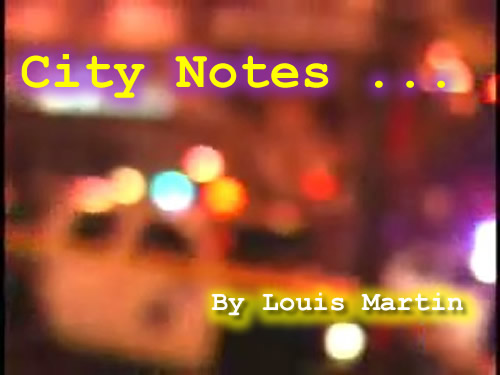
San Francisco—June 10, 2007
Technology, Schmectology. Science, schmience.
Just one more teenager with a gadget.
"Hey, dude, what's up?"
Friday was a day of stress. It starts with driving over to Balboa High School for the graduation and looking for a parking place. Then waiting with a lot of parents to get into the auditorium. It is cold out. A foggy wind from the ocean chills to the bone. Those who have dressed warmly are okay. The young with hot blood are okay. But those who dressed to show off their bodies are very uncomfortable. A black woman in a silky thin dress is distressed about being kept out. She is muttering to the crowd at large. Then we are let in.
Actually, I think our lateness is a blessing. We have missed several speeches. But it is nice to see all the kids on stage in their caps and gowns. It is a big day. No more high school! At least that is the way it was for me back then. I was a raw, uncomfortable youth back then. Nothing fit me. Not my pants, not my shoes, not my shirt; not the ideas that I tried to absorb, not the attitudes that I tried to assume, not the feelings I had that I was informed were all wrong. High school is a tough time. But my little kid—I sponsor a Chinese girl who was graduating—is a much better human being than I am. And much more adjusted to people and life and friends. She is a delight because she is everything I'm not. She likes other people, distrusts them only a little. She is very Chinese in a lot of ways.
Anyway, I sat in the very last row in the balcony of the auditorium and I began to feel those old feelings of the detached outsider that I mostly felt in high school. But then I find myself clapping for kids when their names are called. Some of the parents and friends are fun to watch when their kid's name is called. They go berserk shouting their name. The Hispanic folks seem to enjoy this the most. Blacks to a lesser degree but they are definitely in there howling. Then there are the parents of the Asian kids, who are more reserved. And a few Anglos like me on the edge. Yes, we can shout too but we are mostly in there analyzing the situation or taking our emotional temperature or wondering why. We are using our intellects to dissect the situation and put it into some broader context. Yes, we are a sad bunch. The joyless people. The people of no fun. Funless funny folks. Sunless sunny ... Always trying to pull something out of nothing. But then they call her name, "Yan Ran Tao," and I'm up shouting, "Yeah, Yan Yan! Go Yan Yan!" I have betrayed my culture and sit back down ashamed. A big black guy, looking a little puzzled, asks me, "That your kid?"
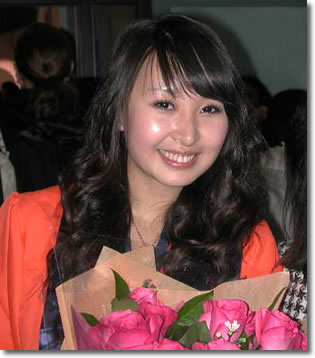
The void is death. Once you accept Mr. Death, you can go from there; the void begins to fill back up. But not by stuffing yourself with French bread; the faucet is beyond your reach. At ease with the void, you simply have to wait.
Later on I go down to Vignette on Bush Street. There is no music tonight and the place is practically empty. But Bradley, the bartender, is there. "What'll it be?" he asks.
"Happiness," I say. "Straight up with a twist."
"Sorry, we're out of that one. Can I get you anything else?"
"What kind of Whiskey ya got?"
"Well, let us see about that," says Bradley. "We got Nob Creek, we got Maker's Mark, we got Basil Haden, we got Jack Daniels, of course ..."
"Let's do Nob Creek."
"Good choice," says Bradley.
"So no Tangria tomorrow," I say.
Tangria is the name of the trio that has been playing at Vignette for the last eight months. It's Sheryl Mebane, drums; Justin Hellman, bass; and Simon Rochester, piano. They are not only fine musicians individually, but together they generate excitement. Part of the excitement comes, I think, from the chemistry between Sheryl on drums and Justin on bass.
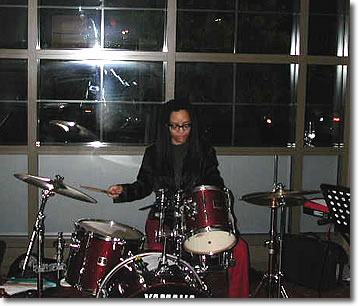
"No, not tomorrow," says Bradley. "There did not seem to be the audience."
That is too bad. Getting people to come up Bush Street from downtown for music is a tough one. Downtown there is Cafe Claude, Cafe Bastille, Le Central ... There are plenty of drinkers at the bars up on Bush Street, such as Chelsea Place, Summer Home, and Yong San Lounge, but they are not exactly a jazz crowd. It is a complicated formula that makes for a successful jazz place. Ditto for a successful life. I know all about the latter.
"How is that drink?" asks Bradley.
"Very happy," I say. "Can I take the bottle home with me?"
"Only if you marry her," he says.
The next Big Thing isn't.
The last Big Thing wasn't.
Just say "so what?" and walk off.
Saturday I stop by the Laurel Court at the Fairmont Hotel to hear Eric Shifrin and the In Crowd, his in trio.
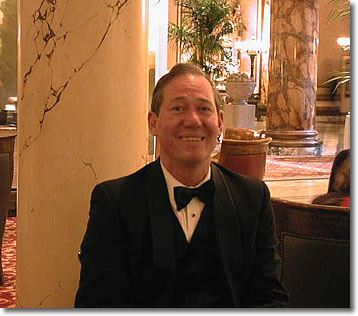
He knows I like sad songs and says he is going to play the saddest song ever composed: "Goodbye."
It's time that we parted
It's much better so
But kiss me as you go
Good-bye
Good-bye
Good-bye
Not exactly words to cheer you up. Or so you would think. But for me, hitting rock bottom is one of the easiest ways to make me come up. No other direction to go. And you get to experience the full range of emotions. For me it is antidote for depression. Depression curing depression, if you want to think about it that way. Chet Baker and Art Pepper play gorgeous instrumental versions of this song. Art Pepper takes it down about as soulful as you can get here on earth. It sounds like something Orpheus might have played in Hades to get Eurydice, his bride, back from Pluto. Art Pepper must have worked hard, taking drugs or whatever, to plunge such depths of sound. But thanks for trying, Eric. Your version was just a little too cheerful for me.
Older women can be sad trying to fill a void that cannot be filled. Older guys too. The glow is gone and force yields nothing. But it is not American to wait. So the void is assaulted. But what does the void care? It has nothing to lose.
So I heard that Cesaria Evora was in town and playing the Masonic Auditorium on Saturday. She's one who knows the range of feelings, all of them. She used to be one of my favorites but I have not listened to her in awhile. But it was a pricey event: $75 for the good tickets, $25 for the cheap ones. And I had other things to do Saturday. But then after the Fairmont Hotel I'm walking right by the Masonic and I think just maybe I can manage a glimpse of the great singer from Cape Verde on the north coast of Africa. I walk into the big auditorium and ask a guy at a table where the show's at. "Last number, I think," he says. Some people have already left. I walk over toward the theatre doors. The ushers don't seem to be paying attention at this point. I can tell; I used to work as an usher. I walk around the left side, then gently pull a door open and slip inside. I stand at the back. People are clapping for an encore. I clap vigorously. "Yes, bring her back, bring her back. I've paid nothing but, damnit, I want to hear her sing." I was in luck. The Queen of Sad Songs from Cape Verde reappeared on stage with her troupe of musicians, including a new guitarist name Tcheka.
The sound was about as lovely and melancholy as you can get. I got out my camera to get a shot. The lighting on the stage was perfect, with narrow colored beams of light projecting downward onto the stage in multicolors. I shoot one picture, and the guy next to me says, "You're not supposed to shoot flash in here."
"Sorry," I say, "I meant to turn it off."
People are on their feet about to leave. It is not a big thing at this point. I'm about to shoot again, this time with the flash off, when the girl friend or wife of the guy butts in:
"You're not supposed to shoot at all in here," she says. "Someone's going to come around and take your camera away."
She sounds like the executive wife with her night off at the theatre, unable to quit managing business, hers and everyone else's. I see a flash go off across the theatre and point at it for her sake. Everyone is now taking pictures with their cell phones. I don't think Cesaria would object. She is not a fascist-type business manager. In fact, I think she would be delighted. With that thought I shoot another picture. No usher wrestles me to the floor. It is a little like the day before at the graduation when one of the teachers asked people to hold their applause till the end of the reading of the graduates' names. That order lasted about 30 seconds. Given the emotions of the crowd, it was just not possible. "Not yell when little Juanita gets her paper? To hell with you. JUANITA! YEAH! JUANITA!"
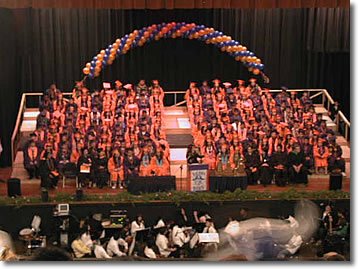
Science, Schmience; Technology, Schmectology. The Because & the How. Kids with gadgets. "Hey, dude?" Young uns of the void. The void itself made visible by the gadget with a voice. The voice of the void. "Hey, girl?"
Thursday flashback: Oak Street. New construction. Plywood rectangles sprayed with stucco. You could put your hand through it. Your eyes see through walls. 'cause there's nothing there, really. Just bad ideas on paper called architecture, cheap materials thrown together by carpenters who aren't, and lived in by people who are hoping to become human someday. Not a pretty picture. Same thing on the corner of Pine and Jones Streets. Have a look:
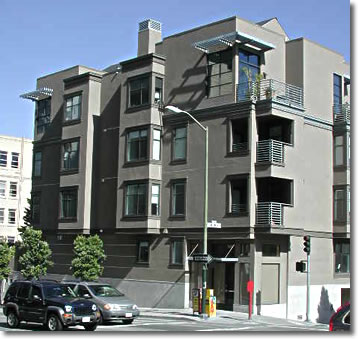
That's the new San Francisco. Now have a look at a nearby older building on Jones Street:
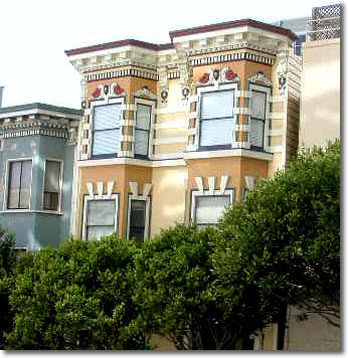
Where does this all lead? Nowhere. To the void. Get used to it. It's not hard. You already are.
Let's say it again: Technology, Schmectology. & the next Big Thing isn't. Isn't, wasn't. Just the void.
Ernest Johnson of Oakland is getting used to the void right now. But he didn't want to. He was "executed" at Donut World at 6th and Market Street last Saturday. There's a single frame from a surveillance video on the SFPD web site but the image is vague, blurry. At the most, you can see that the assailant is black and is a little taller than Johnson, who is or was 6' 2''. Both victim and assailant look like they are wearing blue plaid jackets. But then so does Donut World. So you can probably forget the blue plaid jacket thing. There were also reports of three other customers in the shop but they do not show up in the photo. And at a little after one in the morning, when the shooting took place, the other side of the shop is closed. So maybe you can forget about those other customers, although if they were there, I think you can count on this: They would also appear in blue plaid jackets.
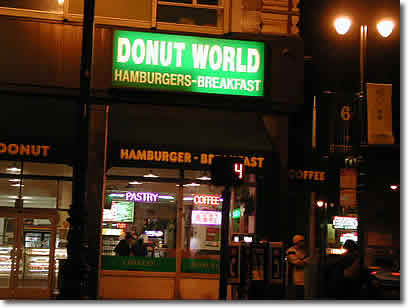
They claim this was all over drug territory, with the victim from Oakland, the assailant from Richmond. Could be. But I'm baffled by one thing. I've never seen a single drug sale in this area, even though that is its claim to fame. Likely I just don't know how it works.
I have called the homicide inspector twice to ask some questions but there is no answer and his phone doesn't take messages. I hope he has not been done in too. So far, I would say this: The solution of this case does not look promising. But then there are a lot of unsolved homicide cases with the SFPD. You can see the many victims here.
Saturday night, following my photo shoot at the Masonic, I head down Taylor toward Market. It's about 11:00. I have an "agenda." I want to ask a couple of questions. I take a left on Eddy so I can walk past the yup club there. It's lined up with kids waiting to get in: Young dudes with cool casual coats, spiked hair; young dudettes, a lot Asian, with little on and looking very cold but wearing eager smiles nevertheless. What makes this worth it? I'm not sure. I don't think it is a conscious thing with anyone there. They are simply "drawn" by the forces. A magnet attracting young people is turned on at the clubs about 9:00 PM and they simply show up. Why the Tenderloin? Do they love the smell of pee in the streets? I doubt it. I think it has to do with permits for these clubs. No objections in the 'loin. The residents have no power and could probably care less.
At the club on Eddy, the cops are already there with a paddy wagon. They look like they are about to bust someone but I don't see any provocation. I position myself near a squad car and watch. I start to get the video camera out of my bag. But then they get back in their cars and drive off. I walk on down to Mason and turn right there. There is another club across the street, a smaller one. I talk to a black guy named Anthony who is hanging out with a guy sprawled in a doorway. He has some marijuana that I think he wants to sell me. His eyes are glossy. I move on down to Market street. I'm just a block down from Donut World where last week's shooting took place. Just around the corner on Market I see a guy I've seen there before. I had been thinking of him earlier. He reminds me of the character in the police photo, as vague as it is. He's in the shadows of the corner, a tall, unsmiling black guy with kind of square features or angular ones. He's the best match I know of for the shooter. But I'm not saying he's it. Just the closest match I know. He's tall, silent, looks the brooding type. He eyes me and I don't look back. I proceed down the street toward Donut World on the opposite side from it. Finally I'm crossing the crosswalk to it, just like last week. It's all lit up but there are no customers. I go in and call out. No one appears. I look around, recognizing stuff on the walls that showed up in the blurry police photo. I look around for the surveillance camera. It looks like there are three of them. I spot the one that shot the police photo. It's behind the counter to the right on the wall. Finally I yell out "Anyone here?" and a guy appears from the back. I order a croissant and an iced donut. As he starts to put them in a bag, I say, "Hey, some bad stuff happened here last Saturday. You here?"
He's a young Hispanic guy. He says he was off but his friend was working.
"Sounds like an execution," I said.
"Yeah, it was an execution," he says.
I heard the shooter was shouting racial slurs at the victim before he shot him. Also told him that people from Oakland were not welcome. I asked the guy in back of the counter if he knew if that were true. He said it wasn't.
"He just walked in and shot him."
"Was there anyone else here, other than the employees?" I asked.
He said there were three others.
"Where were they?" I ask. "They don't show up in the police photo."
"They were over there," he says pointing to the right side of the counter facing me.
"Was this section closed off?" He says it was closed off. There is a sit-down area that is usually closed off late at night, leaving little room for people at the counter. Still, I suppose it was possible for three people to be standing off to the right and the camera to not pick them up.
There is a new red rug on the floor at the counter. It is shoved up right against it. I'm not sure what it is for. Were they able to clean the blood out from beneath the counter? Curious. Blood was all over. It must have run under the counter. I didn't ask about the rug.
He hands me the bag with the croissant and the donut and I give him a five dollar bill. He gives me two dollars back and some change. I leave the change on the counter.
I recross the street, now heading toward Turk. There are only a few people on the corner now. I head up Turk toward Taylor and Club 21. There are more folks on the corner across the street from Club 21.
On the other side of the street I see a guy who looks like a little ex-boxer from New York named Morino but I continue on to Club 21. I want to talk with Frank.

Club 21 is crowded when I walk in. Frank pours me a Jack Daniels and I tell him I was down last week and ran into the shooting.
"Yeah, I saw you walk by," says Frank. Frank has a good eye. I didn't stop because I was shook up and wanted to go home and digest the whole thing.
I talk with an older guy in a baseball cap who says he remembers when Herb Caen used to come down and stair out the big glass windows at Club 21 and watch the street. "He called it the 'fishbowl of the Tenderloin,'" he said.
Finally the place clears out a bit and Frank comes over.
"Hey, Frank," I say, "I'm curious. I spend a lot of time down here but I don't understand how things work. I don't ever see a sale being made. I never see money being exchanged; I don't see a little bag or whatever being passed. Am I just blind?"
Frank laughs.
"You just haven't been around long enough. I see it all the time. The guys take the money, the girls have the stuff tucked into their panties. That's because the police can't search them without a permit of something. Makes searching them difficult."
"Okay, okay, I will watch more carefully. But I hear about all this big money down here. Is there big money in that? Do the homeless buy the stuff?"
Frank looked like he didn't quite know.
Now Morino walks in and sits down next to me at the end of the bar. Frank takes care of a customer. Then his daughter comes in with some friends and he is taking care of them. I tell Morino that just when I left Club 65 last week—we had been having a conversation there—I walked into the shooting over at Donut World.
"Yeah, dem niggers shooting each other again," says Morino.
Morino is an incurable user of the N word. He has explained to me that he doesn't mean anything by it. "Dey call me things too," he says. What can I say?
"Guy got knifed too," adds Morino.
"I was there for both," I say. "Looks like a drug thing. Territory."
"Oh, yeah, dey's always fightin' over der territory," says Morino.
"But now the thing I don't understand is who buys all this stuff? Can the homeless afford it? What about the clubs? Think they sell it there?"
"Sure dey do," says Morino. "Just pass the manager a little dough to let 'em in. Dees kids love da stuff."
"And what about the police?" I ask.
"Dey pay 'em sompin' too," says Morino. "Den dey look da otter way."
"You think so?"
"I know so," says Morino.
This was possible. But I wasn't so sure. Morino was a little too sure about everything. Still, he had Frank's eyes. He saw stuff I didn't.
I don't think I have the whole picture yet. But the pieces are coming together. Big money? That I still couldn't see. But murder. I don't think you kill for nothing.
The void. It has a price. But you don't pay for it. You're sent there by the other guy.
Home | City Notes | Restaurant Guide | Galleries | Site Map | Search | Contact